prostate cancer
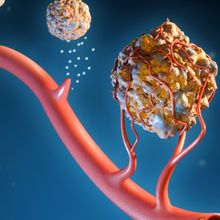
Toppling the Genetic Dominoes in Bone Metastasis
Laura Tran, PhD | Feb 15, 2024 | 4 min read
A key gene that fuels the molecular cascade driving prostate cancer bone metastasis progression may open avenues for targeted therapies.

Armored CAR T Cells Break Through Immune Suppression in Solid Tumors
Jennifer Zieba, PhD | Sep 26, 2022 | 3 min read
Researchers determined the safety and antitumor ability of genetically engineered CAR T cells that circumvent immune suppression in a prostate cancer phase I clinical trial.
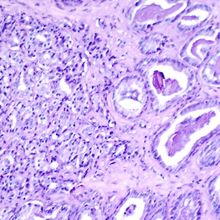
2D Genetic Map of Prostate Cells Charts Cancer Growth
Holly Barker, PhD | Aug 23, 2022 | 4 min read
An in situ map of copy number variations in prostate tissue reveals that purportedly cancerous genomic changes frequently occur in the healthy tissue surrounding tumors.

Setting Better Traps for PARP Inhibitors
The Scientist and BPS Bioscience | Apr 19, 2022 | 4 min read
An innovative assay permits researchers to screen for small molecule PARP inhibitors that trap the enzyme on DNA and selectively execute cancer cells.
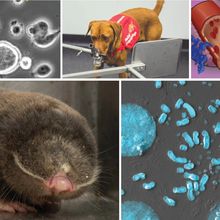
Our Favorite Cancer Stories of 2021
Amanda Heidt | Dec 9, 2021 | 4 min read
This year revealed just how much scientists have learned about the disease, from how animals become naturally cancer-resistant to how tumor cells harness extracellular DNA to develop rapid drug resistance.

Endocrinologist Jean Wilson Dies at 88
Lisa Winter | Jun 24, 2021 | 2 min read
The University of Texas Southwestern professor’s research focused on the androgen hormones that cause male sexual differentiation and may also lead to prostate disease.

Watch a Trained Pup Detect Prostate Cancer From a Urine Sample
Asher Jones | Feb 18, 2021 | 1 min read
Good girl, Florin!
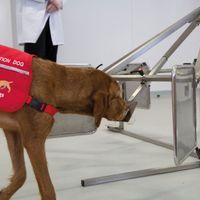
Dogs Are Teaching Machines to Sniff Out Cancer
Asher Jones | Feb 18, 2021 | 5 min read
In a proof-of-concept study, researchers used dogs’ diagnoses of prostate cancer to inform a machine learning algorithm with the goal of one day detecting cancers with canine-level accuracy.
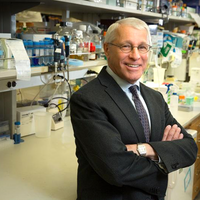
Cracking Down on Cancer: A Profile of Owen Witte
Diana Kwon | Apr 1, 2020 | 9 min read
Through his studies on cancer-causing viruses, the University of California, Los Angeles, professor has helped develop lifesaving treatments.

Cancer Researcher, Former AACR President Dies
Kerry Grens | Nov 13, 2017 | 2 min read
Donald Coffey, a longtime professor at Johns Hopkins University, discovered the nuclear matrix within cells and its role in DNA replication.
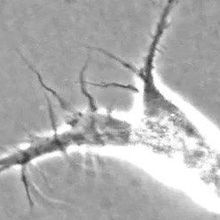
Image of the Day: Cancer Calls
The Scientist | Mar 23, 2017 | 1 min read
The proteins drebin and EB3 are part of a “homing pathway” that helps cancer cells move from the prostate into the bloodstream or lymphatic system.

Pfizer to Buy Medivation for $14 Billion
Bob Grant | Aug 22, 2016 | 1 min read
The pharma giant is purchasing the San Francisco–based cancer drugmaker to boost its oncology portfolio.
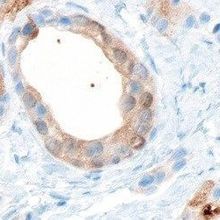
Prostate Organoid from Stem Cells
Jef Akst | Jul 30, 2015 | 1 min read
Researchers construct a 3-D cell model of the prostate gland and use it to show that BPA exposure may increase the risk of cancer in the organ.

Professional Marksman
Anna Azvolinsky | Apr 1, 2015 | 8 min read
Charles Sawyers, who began his research career just as the genetic details of human oncogenes were emerging, codeveloped Gleevec, the quintessential targeted cancer therapy.
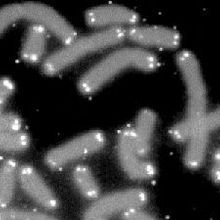
Healthy Lifestyle Lengthens Telomeres?
Kate Yandell | Sep 18, 2013 | 2 min read
Diet, exercise, and stress management may lengthen telomeres, a new study shows, though some scientists are skeptical.

The Role of Neurons in Cancer
Kate Yandell | Jul 15, 2013 | 1 min read
Nerves growing in cancerous prostate glands appear to spur disease progression.

Chicken Virus Attacks Cancer Cells
Bob Grant | Apr 9, 2013 | 1 min read
Researchers have genetically engineered a virus that is deadly to chickens and found that it can kill prostate cancer in vitro.

Cancer Gene Bonanza
Ed Yong | Mar 27, 2013 | 3 min read
International collaboration doubles the number of genetic regions associated with breast, prostate, and ovarian cancers.
Surprise XMRV Retraction
Beth Marie Mole | Sep 21, 2012 | 2 min read
The journal PLOS Pathogens abruptly retracts the seminal paper linking XMRV to disease.
